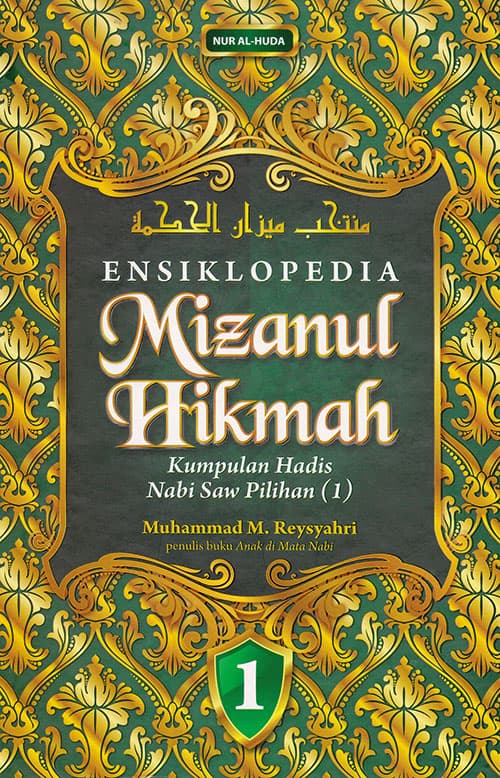Al-Itsar (Mengutamakan Orang Lain Atas Diri Sendiri) – Mizanul Hikmah


BAB I
۱ – الإيثار
١ – فَضْلُ الْإِيْثَارِ
١. الإمامُ عليٌّ عليه السلام :الْإِيْثَارُ أَعْلَى الْمَكَارِمِ (١1)
۲.عنه عليه السلام :الْإِيْثَارُ شِيْمَةُ الْأَبْرَارِ. (4۲)
۳.عنه عليه السلام :الْإِيْثَارُ أَحْسَنُ الْإِحْسَانِ، وَ أَعْلَى مَرَاتِبِ الْإِيْمَانِ. (7٣)
٤.عنه عليه السلام :الْإِيْثَارُ أَفْضَلُ عِبَادَةٍ، وَ أَجَلُّ سِيَادَةٍ. (10٤)
٥.عنه عليه السلام :أَفْضَلُ السَّخَاءِ الْإِيْثَارُ. (13٥)
٦.عنه عليه السلام :عَامِلْ سَائِرَ النَّاسِ بِالْإِنْصَافِ، وَ عَامِلِ الْمُؤْمِنِيْنَ بِالْإِيْثَارِ .(16٦)
۷.عنه عليه السلام :غَايَةُ الْمَكَارِمِ الْإِيْثَارُ. (19٧)
۸.عنه عليه السلام :بِالْإِيْثَارِ يُسْتَرَقُّ الْأَحْرَارُ. (22٨) (اُنظر) الإنفاق: باب ۱۷٦۰ ، ۱۷٦۲ ./R
۲ – فَضْلُ الْمُؤْثِرِيْنَ
(وَ الَّذِيْنَ تَبَوَّءُو الدَّارَ وَ الْإِيْمَانَ مِنْ قَبْلِهِمْ يُحِبُّوْنَ مَنْ هَاجَرَ إِلَيْهِمْ وَ لَا يَجِدُوْنَ فِيْ صُدُوْرِهِمْ حَاجَةً مِّمَّا أُوْتُوْا وَ يُؤْثِرُوْنَ عَلَى أَنْفُسِهِمْ وَ لَوْ كَانَ بِهِمْ خَصَاصَةٌ وَ مَنْ يُوْقَ شُحَّ نَفْسِهِ فَأُولَئِكَ هُمُ الْمُفْلِحُوْنَ) (25٩)
“[They are as well] for those who were settled in the land and [abided] in faith before them, who love those who migrate toward them, and do not find in their breasts any need for that which is given to them, but prefer [the Immigrants] to themselves, though poverty be their own lot. And those who are saved from their own greed – it is they who are the felicitous.” (1826)
Allah s.w.t. berfirman: “Dan orang-orang yang telah menempati Kota Madīnah dan telah beriman (Anshār) sebelum (kedatangan) mereka (Muhājirīn), mereka mencintai orang yang berhijrah kepada mereka. Dan mereka tiada menaruh keinginan dalam hati mereka terhadap apa-apa yang diberikan kepada mereka (orang Muhajirin); dan mereka mengutamakan (orang-orang Muhajirin) atas diri mereka sendiri, sekalipun mereka memerlukan (apa yang mereka berikan itu). Dan siapa yang dipelihara dari kekikiran dirinya, mereka itulah orang-orang yang beruntung.” (927)
۹.الْأَمَالِي لِلطُّوْسِيْ عَنْ أَبِيْ هُرَيْرَةَ :جَاءَ رَجُلٌ إِلَى النَّبِيِّ صَلَّى اللهُ عَلَيْهِ وَ آلِهِ، فَشَكَا إِلَيْهِ الْجُوْعَ، فَبَعَثَ رَسُوْلُ اللهِ صَلَّى اللهُ عَلَيْهِ وَ آلِهِ إِلَى بُيُوْتِ أَزْوَاجِهِ فَقُلْنَ :مَا عِنْدَنَا إِلَّا الْمَاءُ. فَقَالَ رَسُوْلُ اللهِ صَلَّى اللهُ عَلَيْهِ وَ آلِهِ: مَنْ لِهذَا الرَّجُلِ اللَّيْلَةَ؟ فَقَالَ عَلِيُّ بْنُ أَبِيْ طَالِبٍ عَلَيْهِ السَّلَامُ: أَنَا لَهُ يَا رَسُوْلَ اللهِ. وَ أَتَى فَاطِمَةَ عَلَيْهَا السَّلَامُ فَقَالَ لَهَا: مَا عِنْدَكِ يَا ابْنَةَ رَسُوْلِ اللهِ؟ فَقَالَتْ: مَا عِنْدَنَا إِلَّا قُوْتُ الصَّبِيَّةِ، لكِنَّا نُؤْثِرُ ضَيْفَنَا، فَقَالَ عليه السلام: يَا ابْنَةَ مُحَمَّدٍ، نَوِّمِي الصِّبْيَةَ وَ أَطْفِئِي الْمِصْبَاحَ. فَلَمَّا أَصْبَحَ عَلِيٌّ عليه السلام غَدَا عَلَى رَسُوْلِ اللهِ صلى الله عليه و آله فَأَخْبَرَهُ الْخَبَرَ، فَلَمْ يَبْرَحْ حَتَّى أَنْزَلَ اللهُ عَزَّ وَ جَلَّ :(وَ يُؤْثِرُوْنَ…) (28١).
Rasūlullāh s.a.w. bersabda: “Siapakah yang akan memberi makan kepada pria ini pada malam ini?”
Imam ‘Alī bin Abī Thālib a.s. menjawab: “Saya, wahai Rasūlullāh.”
Imām ‘Alī a.s. datang menemui Sayyidah Fāthimah a.s. seraya bertanya kepadanya: “Apa yang engkau miliki, wahai putri Rasūlullāh?”
Sayyidah Fāthimah a.s. menjawab: “Kita tidak memiliki apa pun kecuali makan malam (kita), tetapi kita mengutamakan tamu atas diri kita sendiri.”
Kemudian Imām ‘Alī a.s. berkata kepada Sayyidah Fāthimah a.s.: “Wahai putri Rasūlullāh, tidurkan anak-anak dan matikan lampu!”
Keesokan harinya, Imām ‘Alī a.s. mendatangi Rasūlullāh s.a.w. dan mengabarkan kepada beliau apa yang telah dilakukannya terhadap tamunya itu. Tidak lama berselang, Allah ‘azza wa jalla menurunkan firman-Nya…. dan mereka mengutamakan… (130)
۱۰.تنبيه الخواطر عن عائشة :مَا شَبِعَ رَسُوْلُ اللهِ صلى الله عليه و آله ثَلَاثةَ أَيَّامٍ مُتَوَالِيَةٍ حَتَّى فَارَقَ الدُّنْيَا. وَ لَوْ شَاءَ لَشَبِعَ، وَ لكِنَّهُ كَانَ يُؤْثِرُ عَلَى نَفْسِهِ (31٢)
۱۱.مجمع البيان عن أبي الطفيل :اِشْتَرَى عَلِيٌّ عليه السلام ثَوْبًا، فَأَعْجَبَهُ فَتَصَدَّقَ بِهِ، وَ قَالَ: سَمِعْتُ رَسُوْلَ اللهِ صلى الله عليه و آله يَقُوْلُ: مَنْ آثَرَ عَلَى نَفْسِهِ آثَرَهُ اللهُ يَوْمَ الْقِيَامَةِ الْجَنّةَ (34٣).
۱۲.الإمامُ الصّادقُ عليه السلام – فِيْ قَوْلِهِ تَعَالَى): وَ يُطْعِمُوْنَ الطَّعَامَ عَلَى حُبِّهِ مِسْكِيْنًا وَ يَتِيْمًا وَ أَسِيْرًا: – (كَانَ عِنْدَ فَاطِمَةَ عليها السلام شَعِيْرٌ، فَجَعَلُوْهُ عَصِيْدَةً، فَلَمَّا أَنْضَجُوْهَا وَ وَضَعُوْهَا بَيْنَ أَيْدِيْهِمْ جَاءَ مِسْكِيْنٌ، فَقَالَ الْمِسْكِيْنُ :رَحِمَكُمُ اللهُ! أَطْعِمُوْنَا مِمَّا رَزَقَكُمُ اللهُ، فَقَامَ عَلِيٌّ عليه السلام فَأَعْطَاهُ ثُلُثَهَا. فَمَا لَبِثَ أَنْ جَاءَ يَتيْمٌ، فَقَالَ الْيَتِيْمُ: رَحِمَكُمُ اللهُ! أَطْعِمُوْنَا مِمَّا رَزَقَكُمُ اللهُ، فَقَامَ عَلِيٌّ عليه السلام فَأَعْطَاهُ ثُلُثَهَا الثَّانِيَ. فَمَا لَبِثَ أَنْ جَاءَ أَسِيْرٌ، فَقَالَ الْأَسِيْرُ: يَرْحَمُكُمُ اللهُ! أَطْعِمُوْنَا مِمَّا رَزَقَكُمُ اللهُ، فَقَامَ عَلِيٌّ عليه السلام فَأَعْطَاهُ الثُّلُثَ الْبَاقِيَ، وَ مَا ذاقُوْهَا. فَأَنْزَلَ اللهُ فِيْهِمْ هذِهِ الْآيَةَ إِلَى قَوْلِهِ): وَ كَانَ سَعْيُكُمْ مَّشْكُوْرًا (37٤).
Tak lama, datanglah anak yatim seraya berkata: “Semoga Allah merahmati kalian, berilah saya makan!”
Imām ‘Alī a.s. berdiri lagi dan memberinya sepertiga (makanan itu). Mereka tidak menyantap makanan itu sedikit pun. Kemudian Allah Yang Maha Suci menurunkan ayat-ayat (surah al-Insān) berkenaan dengan mereka. Ayat-ayat tersebut berlaku bagi setiap mu’min yang melakukan hal itu semata-mata mengharap keridhaan Allah ‘azza wa jalla.” (439)